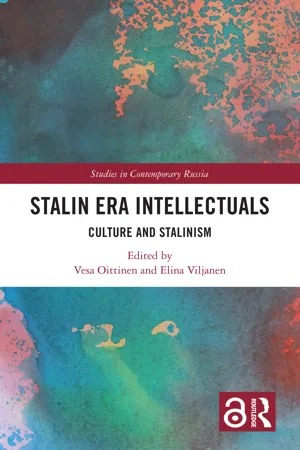
- 270 pages
- English
- ePUB (mobile friendly)
- Available on iOS & Android
About This Book
This book focuses on the extent to which Soviet scholars and cultural theoreticians were able to act autonomously during the Stalin era. The authors question how we should consider certain intellectual achievements which took place despite the pressure of Stalinism, and how best to recognise and describe such achievements. The chapters in this book offer suggestions for new interpretations on Soviet philosophy of science and humanities, linguistics, philosophy, musicology, literature and mathematics from the point of view of general cultural theory. In this way, they challenge the received image of the Stalin-era humanities which reduces them into mere propaganda. Intended for scholars of Russian and Soviet studies, this book will dispel many received views about the character of Stalinism and Soviet culture.
Chapters 1, 2, 4, 6, 10 and 13 of this book are freely available as downloadable Open Access PDFs at http://www.taylorfrancis.com under a Creative Commons Attribution-Non Commercial-No Derivatives (CC-BY-NC-ND) 4.0 license.
Frequently asked questions
Information
Table of contents
- Cover
- Endorsement
- Half-Title
- Series
- Title
- Copyright
- Contents
- Editors
- List of contributors
- Contact Information
- Acknowledgements
- 1 Introduction: On Soviet Intellectual Culture during the Stalin Era
- 2 Fighting Avant-Garde with Phenomenology: Gustav Shpet’s ‘New Realism’
- 3 Stalin and Philosophy in Soviet Russia
- 4 ‘Menshevising Idealism’ and Stalinisation of Philosophy
- 5 The Naked Truth of Fact: Andrey Platonov on the Margins of Factography
- 6 Everyday Symphonism: Boris Asafiev’s Soviet Theory of Popular Music
- 7 Confronting Modernism in the Stalin Era: Mikhail Lifshits as Critic and Philosopher of Culture
- 8 Maxim Gorky as Spokesman for Proletarian Humanism
- 9 Sofya Yanovskaya in Defence of Abstractions: Between Soviet Ideology and Bourgeois Idealism
- 10 The Anti-Fascist Cultural Theory of Nikolai Bukharin and the Concept of Socialist Humanism
- 11 Nikolay Marr’s Theory of Language and Konstantin Megrelidze’s Historical Science of Thought
- 12 Between Critique and Conformism: The Languages and Cultures of Caste and Nation in Stalin-Era Indology
- 13 Stalinism, War, and Artistic Representation of Reality: Konstantin Simonov’s Critique of the ‘System of Silence’ in 1956
- Index